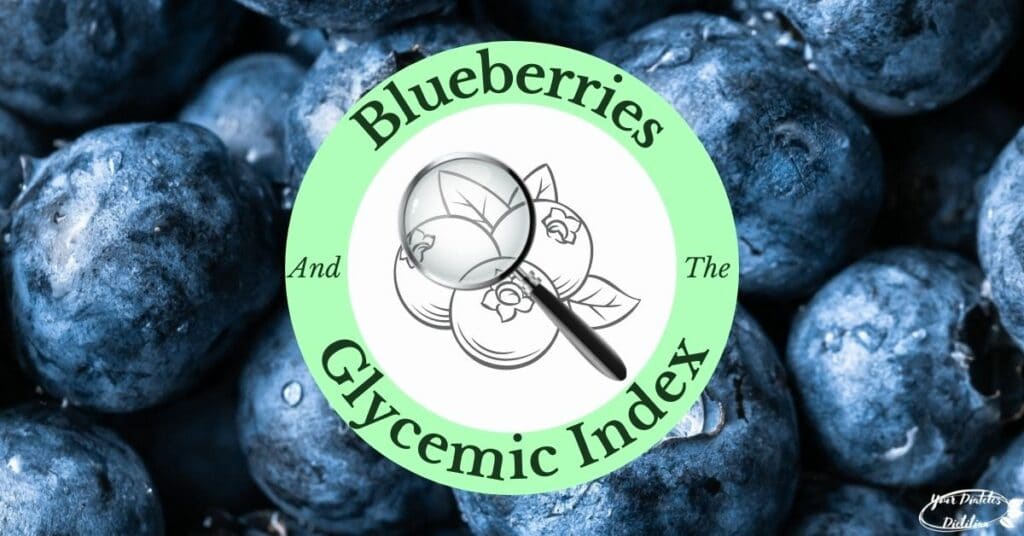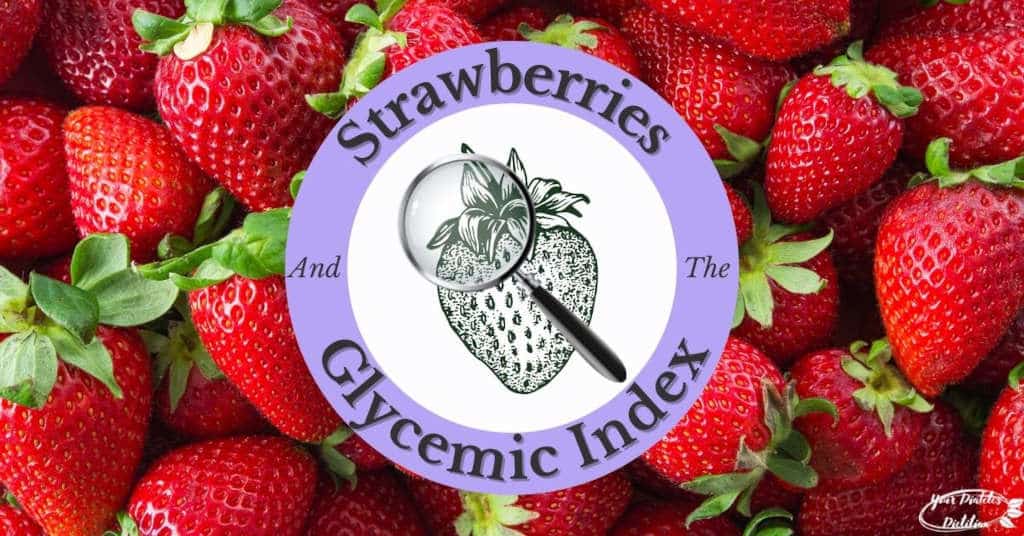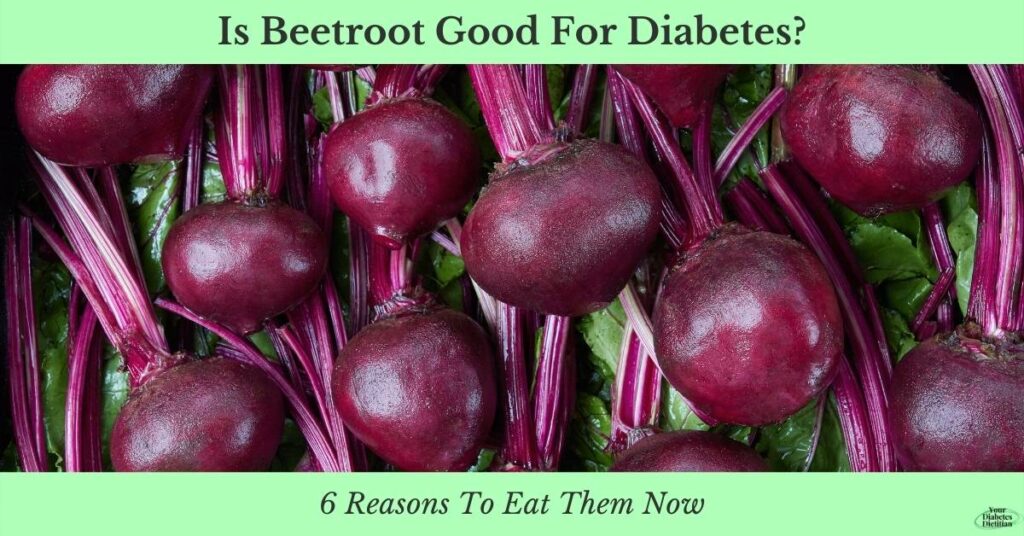Let’s face it, we all need a boost sometimes. The shiny cans, the fizzy flavors, the caffeine. Energy drinks are popular among athletes, but are there energy drinks for diabetes out there? What are the common ingredients? Are they safe?
It’s no longer only about Red Bull. In this blog post, we’ll dive deeper into energy drinks and whether or not they are recommended.
DISCLAIMER: This post was written by Justine Chan MHSc, RD, CDE. All content on this site is for informational purposes only and is not a substitute for professional medical or nutritional advice. Always seek medical and dietary advice from your doctor or dietitian.
Your Diabetes Dietitian is reader supported. Please note that this article contains affiliate links. If you click on one of these links and make a purchase, I may earn a commission at no extra cost to you.
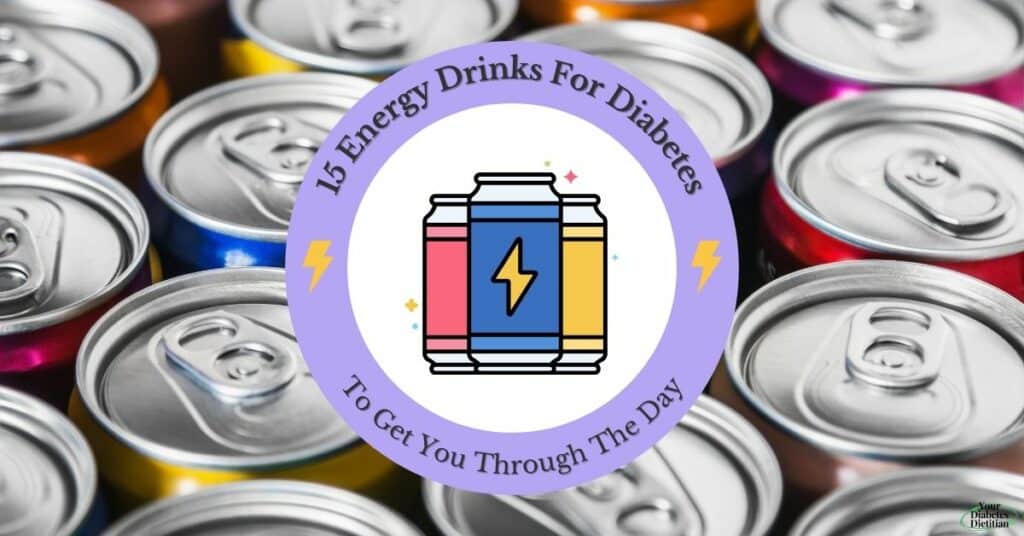
Table of Contents
What are energy drinks?
Energy drinks have been around since 1960. They often contain caffeine as well as vitamins, minerals, amino acids, and possibly other beneficial plant-based compounds (1).
You can find them at your local grocery store and anyone of any age can buy it. In fact, in the United States and Europe, it’s estimated that 20 to 50% of young adults consume energy drinks (2).
Active ingredients
Energy drinks are often used by athletes. If you’re wondering which ingredients are key for sports performance, you’re likely looking at taurine and caffeine (1).
Taurine is an amino acid that is made in small amounts by your liver but also found widely in meat and seafood. Energy drinks contain anywhere from 71 to 3105mg (1), which is a dose that generally does not cause any side effects.
Taurine may improve blood pressure and cholesterol, as well as improve your physical endurance during training.
As for caffeine, actual caffeine content may not be listed on the product’s label or on its website (2). However, in Canada for example, there is generally 80 to 180 mg of caffeine in a given energy drink.
What can happen when you consume energy drinks?
While it’s been well studied that energy drinks may improve your athletic performance, there are numerous risks. Energy drinks can cause other problems such as:
- Heart problems, including high blood pressure and faster heart rate
- Difficulty sleeping, anxiety, chronic headaches
- Upset stomach
- Vomiting
- Convulsions
- Dental problems
Not to mention, you may end up depending on energy drinks which can also worsen your mental health (1). There are many other problems that have been cited in research, including liver damage, depression, high blood sugars, and heart attacks (3, 4).
Energy drinks are especially a problem among kids. There is just too much caffeine and other stimulants in energy drinks, and it’s the reason for thousands of emergency visits each year (2).
These side effects are possible in anyone, but if you’re pregnant or nursing, sensitive to caffeine or have heart problems, you are at a higher risk and should avoid these types of drinks. What about the long term effects? We don’t know at this point (1).
What’s more, energy drinks may also lead you to drink alcohol (2). In fact, it’s common to mix energy drinks with alcohol and this type of concoction can lead to binge drinking (2). This is bad news, especially given that alcohol can prolong caffeine’s effect on your body (3).
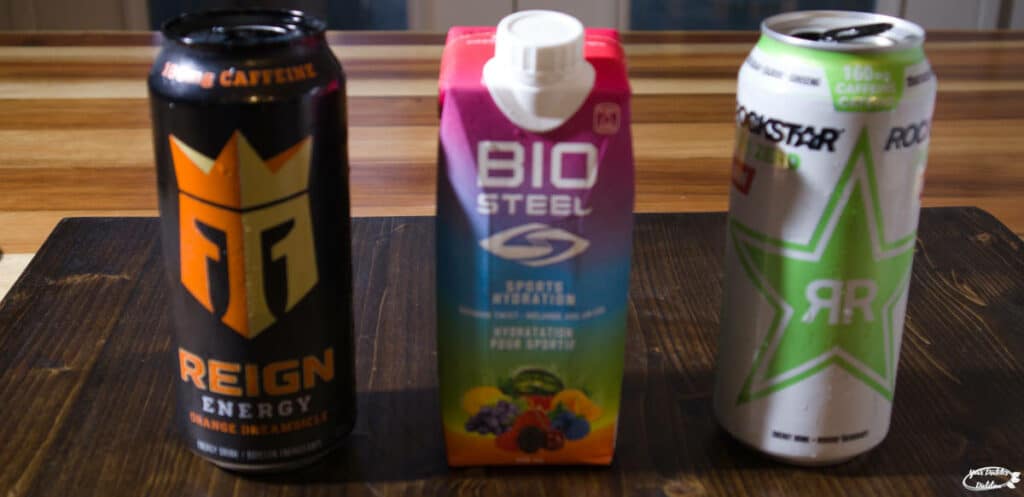
Are energy drinks okay for diabetes?
Overall, energy drinks are not recommended for people with diabetes. These drinks are typically high in sugar and caffeine, which will make managing blood sugars more challenging.
It’s obvious that sugary drinks can quickly raise blood sugar levels. What’s more, caffeine may increase insulin resistance in the short term, which then can lead to blood sugar spikes. Either way, it’s a sticky situation.
Energy drinks may not be good for your heart, especially if you already have heart problems. You may experience a faster heart beat and higher blood pressure, thanks to caffeine. This is because of the effects of caffeine and possibly sodium.
We also don’t know its long term effects. Sugar free energy drink alternatives are also available. These drinks come in all different flavors, are usually carbonated, and contain other stimulants like guarana.
Even though these energy drinks are low carb, they still may affect your blood sugar. Your best bet is to check your blood sugars before and 2 hours after to assess its impact.
If you want to consume energy drinks, go for the sugar free varieties with the least amount of caffeine and sodium.
What can people with diabetes drink for energy?
The only way you get energy is by consuming foods and beverages that provide energy. Think of your macros – carbs, protein and fat. This means that a drink with 0 calories is not going to magically give you energy.
Therefore, the jolt you feel after an energy drink is from the caffeine and other stimulants. Or perhaps from its hydrating benefit. It’s not from all the other vitamins or whatever is advertised on the energy drink label.
Other hydrating, energizing lower carb beverages to consider:
- Coffee and tea
- Almond milk and other nut milks
- Cow’s milk
- Protein shakes
So how was the list made?
We looked at the lowest dose of caffeine that can lead to symptoms – 200mg (4). This is a range that’s similar to a cup of brewed coffee. The following list of energy drinks for diabetes therefore includes drinks with 200mg or less per serving.
This also falls in line with the 400mg cut off for adults 18 years and up. If you’re younger than 18, it’s recommended to keep caffeine to less than 2.5mg per kg body weight.
Keeping energy drinks for diabetes low carb is ideal, so naturally they will contain no-calorie sweeteners. Common sweeteners in low carb energy drinks include sucralose, stevia, sugar alcohols and acesulfame potassium.
If artificial sweeteners aren’t for you, there are also energy drinks with natural sweeteners like stevia and monk fruit.
And let’s not forget about sodium. Some energy drinks contain electrolytes and therefore a significant amount of sodium. This is helpful if you’re working out for long periods in a hot or dry environment and may be losing a lot of water.
However, chances are, you’re probably looking for a low sodium beverage. Based on the amount that would represent 15 percent of your daily value for sodium, only drinks with less than 360mg per serving were included. This is because 15% or more of your daily value on a nutrition label means it has a lot of that nutrient.
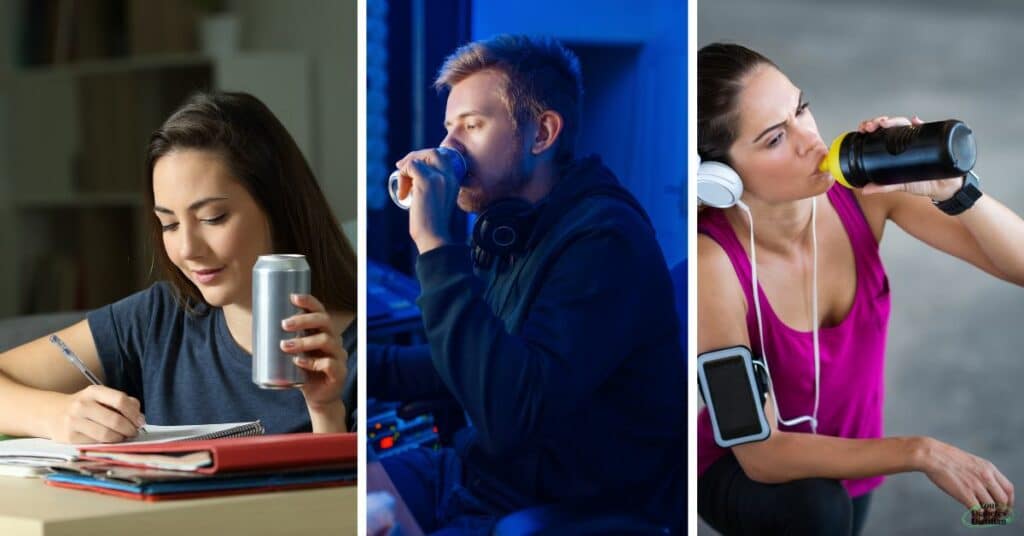
Caffeinated
Aspire
- 0 calories and 0g of carbohydrates
- 80mg caffeine
- Contains calcium, B-vitamins, vitamin C and choline
Aspire is calorie free and a carbonated beverage. Its caffeine comes from guarana seed and green tea extracts. The added vitamins are all within safe levels and it’s sweetened with sucralose.
Wakewater
- 0 calories and 0g of carbohydrates
- 85mg caffeine
- Contains L-theanine
Wakewater has a simple ingredient list with no artificial sweeteners. The caffeine is sourced from green tea. L-theanine is an amino acid that is found in tea and may help to promote relaxation (4).
Zevia Energy
- 0 calories and 0g of carbohydrates
- 120mg caffeine
You are probably familiar with Zevia soda drinks, which come in many flavors. The only difference between Zevia soda drinks and their energy drinks is the added caffeine. As you can guess, Zevia energy drinks are sweetened with stevia.
Red Bull Zero
- 15kcal and 0g of carbohydrates
- 80mg caffeine
- Contains B-vitamins and taurine
This is the iconic energy drink that everyone has heard of. Red Bull Zero is sweetened with sucralose and acesulfame potassium, with water being the main ingredient.
Acesulfame potassium is 200 times sweeter than sugar and is excreted in your urine. Sucralose is 600 times more sweeter than sugar and is not absorbed in your body (5).
Guru Energy Water
- 0kcal, 4g of carbohydrates, 4g of erythritol
- 100mg caffeine
Guru Energy Water’s caffeine is sourced from green tea and it is sweetened with the sugar alcohol erythritol and stevia. This drink comes in 3 flavors: lime, grapefruit and pomegranate.
Zoa Zero Sugar Energy Drink
- 10kcal, 2g of carbohydrates
- 160mg of caffeine in 12oz
- Contains B-vitamins, vitamin C magnesium and turmeric extract
Available in 8 different flavors, Zoa’s energy drinks aim to please. Sweetened with sucralose and acesulfame potassium, these energy drinks also contain your day’s requirement of vitamin C.
G-Fuel Energy Formula Powder
- 15kcal and 0g carbohydrates
- 140mg caffeine
- Contains vitamin C, E and B-vitamins
Each G-Fuel tub has 40 servings and is sweetened with sucralose making it a low calorie beverage. You simply mix the powder with water and ice and you’ve got yourself a slushie.
Rockstar Pure Zero Energy Drink
- 10kcal and 1g carbohydrates
- 85mg caffeine in 8.4oz
- Contains 125mg sodium, guarana, ginseng root extract, taurine and B-vitamins
Rocko is sweetened with sucralose and acesulfame potassium. It comes in a number of sizes and the cucumber lime flavor is carbonated and not overly sweet.
Jocko Fuel
- 10kcal and 0g carbohydrates
- 95mg caffeine
- Contains 115mg sodium, L-theanine, B-vitamins and choline
Jocko Fuel energy drinks come in an abundance of flavors and are sweetened with monk fruit extract. You’re also getting some theobromine which acts as a longer lasting stimulant (5).
Alani Energy Drink
- 10kcal, 3g carbohydrates, 1g sugar alcohol (erythritol)
- 200mg caffeine
- Contains 170mg sodium, ginseng root extract, taurine and B-vitamins
Alani contains ginseng which may help with brain health. There are lots of flavors to choose from and they’re sweet, but keep in mind the caffeine content is higher than other energy drinks.
Celsius-Stevia
- 10kcal, 0g carbohydrates
- 200mg caffeine
- Contains 5mg sodium, B-vitamins, chromium
Celsius drinks are sugar free and sweetened with sucralose. It’s great that their first ingredient is carbonated filtered water. What’s more, chromium may help decrease blood sugars.
Reign
- 10kcal, 3g carbohydrates
- 180mg caffeine
- Contains 220mg sodium, branched chain amino acids, B-vitamins and coenzyme Q10
Reign drinks are sweetened with sucralose making them a low carb option. While branched chain amino acids are “essential” meaning your body does not make them on your own, taking them as a supplement does not lead to faster muscle growth. The orange dreamsicle flavor tastes like an orange crush.
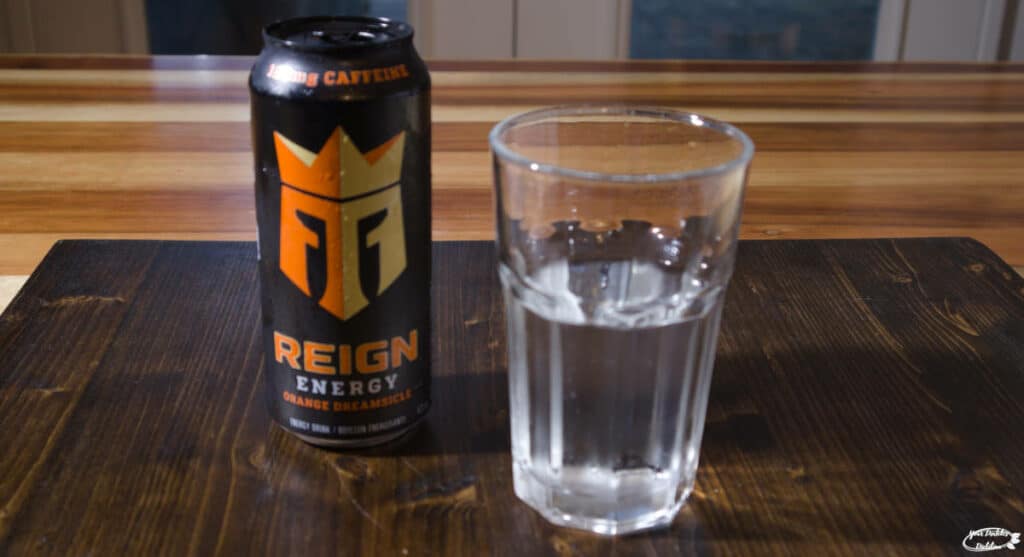
C4 Energy Carbonated
- 0kcal, 0g carbohydrates
- 200mg caffeine
- Contains B-vitamins, beta-alanine
C4 drinks are sweetened with sucralose and acesulfame potassium. What’s more, beta alanine also has been shown to improve your stamina and exercise performance.
Non-caffeinated
Gatorade Fit
- 15 kcal and 3g carbohydrates in 12oz
- Contains electrolytes, 230mg sodium, 50mg potassium, vitamin A and B-vitamins
Sweetened with stevia, Gatorade Fit has no added sugar or dyes. With so many flavors to choose from, this is the perfect thirst quencher for a hot day!
Biosteel Sports Drink
- 10kcal and 1g carbohydrate
- Contains 230mg sodium, and small amounts of potassium, calcium and magnesium
Looking for an electrolyte replacement that’s also a refreshing thirst quencher? Look no further. Biosteels sports drinks are sweetened with stevia and are one of my faves. It’s hard to believe they are actually caffeine free!
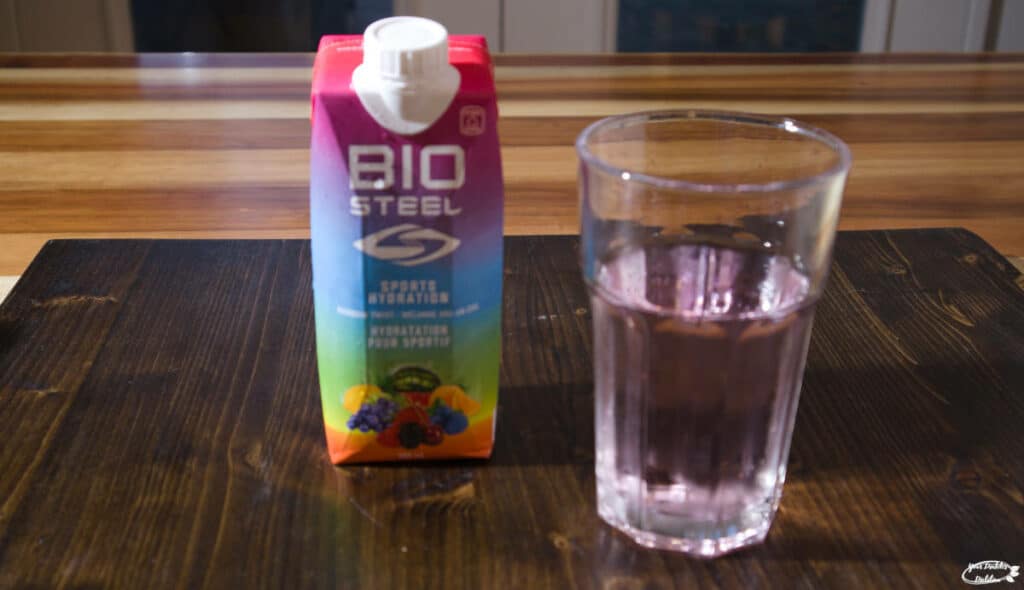
Key takeaways: 15 Energy Drinks For Diabetes To Get You Through The Day
Let’s get this straight, energy drinks are not for everyone. Not for kids, people that are pregnant or nursing, or anyone that is sensitive to caffeine. Not for you if you have heart problems.
If you live with diabetes, energy drinks can make blood sugar management an even bigger challenge. Opt for the energy drink that’s low in carbs and has the least amount of caffeine and sodium. Here are 15 options to choose from that can replace your cup of coffee.
If you enjoyed this post, be sure to follow me on Facebook for more updates!

